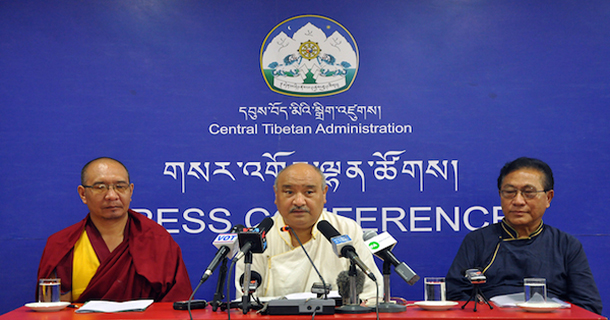The first vote in the Tibetan election of 2015/16 is fast approaching, and the Election Commission of the Central Tibetan Administration (CTA) released a clarified version of the election regulations on September 3. These regulations act as a code of conduct for candidates and their supporters, covering a range of issues in order to increase procedural transparency and fairness. At a press conference, Chief Election Commissioner Sonam Choephel Shosur gave the reason for the announcement, “There are possibilities of individuals misunderstanding the rules and regulations laid out for the upcoming elections”.

Chief Election Commissioner Mr Sonam Choephel Shosur (centre) with Additional Election Commissioners
Photo:tibet.net
Facing only the second ever democratic vote for Sikyong, the Election Commission is focusing on fairness for candidates and voters in an effort to minimise unnecessary political drama for the Tibetan community-in-exile. Article 25 of the Electoral Rules and Regulations covers the giving and receiving of bribes, manipulating candidates, or unfairly affecting the ability of unbiased voting. This regulation also specifies election etiquette for candidates and their representatives, including a warning against tactics of character assassination or campaigning against specific rivals through negative propaganda. This comes as a direct response to the “many unverified and unauthorised documents and pamphlets being circulated ” according to Shosur. Whilst the damage may have already been done, Shosur added that the EC would like these documents to be considered null and void by voters. These legal conditions aim not only to make the election a professional, rational race for candidates, but also to ensure that political unrest amongst the Tibetan community is minimised.
Financial and procedural transparency for candidates and parties is emphasised, with large penalties for evasion or lack of cooperation. Existing CTA members who wish to run for office must not use their CTA position or CTA resources to personal advantage. Maximum expenditure and spending guidelines have been clearly outlined for candidates, and all expenditure should be accounted for by the CTA.
The EC has also stressed that no candidate may use the Dalai Lama’s image, a map of Tibet or the Tibetan flag in any campaign materials. These symbols of national and cultural identity are legally exempt from the political maelstrom of the election.
Incidences that contravene the Election Commission’s regulations will bring about legal punishment, the nullification of a percentage or all of votes for an offending candidate, and/or
cancellation of the right to vote or stand for election for up to ten years. The EC is encouraging the Tibetan community-in-exile to help police and enforce these regulations in an effort to ensure stability and fairness to both candidates and outcome.
Keep up to date on election issues by following this link to our election news page: Election 2016




 Print
Print Email
Email